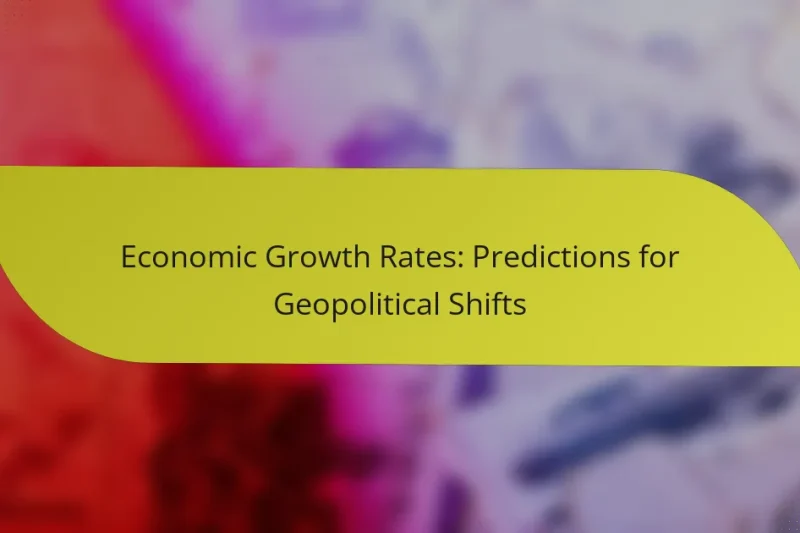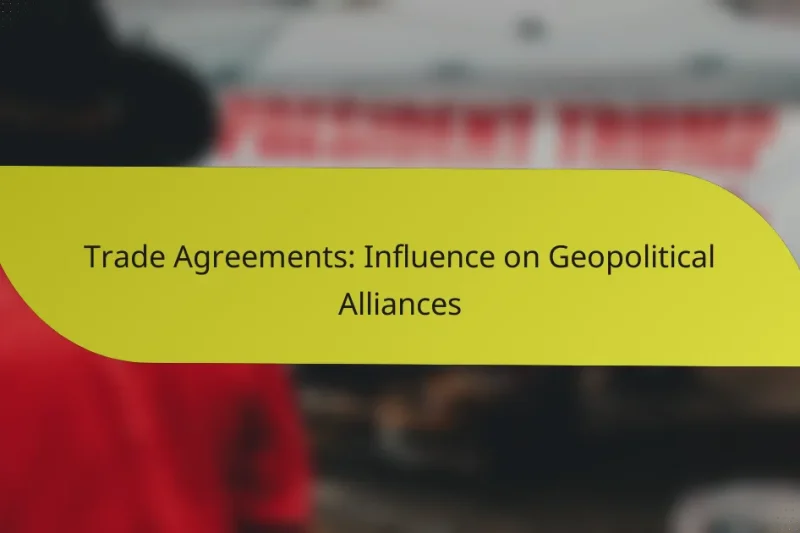Inflation plays a crucial role in shaping political stability, particularly in the United States, where rising … Inflation Rates: Impact on Political StabilityRead more
Economic Factors Impacting Geopolitical Trends
Economic factors play a crucial role in shaping geopolitical trends, influencing everything from trade relationships to political alliances. Key indicators such as GDP growth, unemployment, and inflation rates provide insights into a nation’s stability and can drive shifts in international relations. Additionally, fluctuations in energy prices can significantly impact national security and diplomatic ties, further altering the landscape of global power dynamics.
Currency Fluctuations: Effects on National Security
Currency fluctuations play a critical role in shaping national security by influencing economic stability and military … Currency Fluctuations: Effects on National SecurityRead more
Resource Scarcity: Influence on International Relations
Resource scarcity plays a crucial role in shaping international relations, as nations compete for limited essentials … Resource Scarcity: Influence on International RelationsRead more
Economic Sanctions: Recent Conflict Case Studies
Economic sanctions serve as a critical tool for nations and international organizations aiming to alter the … Economic Sanctions: Recent Conflict Case StudiesRead more
Economic Growth Rates: Predictions for Geopolitical Shifts
As we look ahead, predictions for economic growth rates reveal a landscape shaped by geopolitical tensions, … Economic Growth Rates: Predictions for Geopolitical ShiftsRead more
Trade Agreements: Influence on Geopolitical Alliances
Trade agreements play a crucial role in shaping geopolitical alliances by fostering economic interdependence and collaboration … Trade Agreements: Influence on Geopolitical AlliancesRead more
Unemployment Rates: Effects on Political Movements
Unemployment rates play a crucial role in shaping political movements by influencing public sentiment and collective … Unemployment Rates: Effects on Political MovementsRead more
How do economic factors influence geopolitical trends in Europe?
Economic factors significantly shape geopolitical trends in Europe by affecting trade relationships, political alliances, and overall stability. Changes in economic conditions can lead to shifts in power dynamics and influence diplomatic interactions among nations.
Trade agreements impact political alliances
Trade agreements serve as a foundation for political alliances in Europe, fostering cooperation among member states. For example, the European Union (EU) facilitates trade among its members, which strengthens political ties and promotes stability.
Countries that engage in trade agreements often align their foreign policies to support mutual economic interests. This alignment can lead to collaborative efforts in areas such as security, environmental policies, and humanitarian initiatives.
Currency fluctuations affect diplomatic relations
Currency fluctuations can create tension or foster cooperation among European nations. For instance, a significant drop in the value of a currency can lead to economic instability, prompting countries to reassess their diplomatic strategies and alliances.
Countries with stronger currencies may leverage their economic power to influence weaker nations, potentially leading to unequal relationships. Monitoring exchange rates and economic indicators is crucial for understanding these dynamics.
Resource scarcity drives conflict
Resource scarcity, particularly regarding energy and raw materials, can lead to geopolitical conflicts in Europe. Nations that rely heavily on imports for essential resources may find themselves in competition, which can strain diplomatic relations.
For example, disputes over access to natural gas supplies have historically led to tensions between countries like Russia and Ukraine. Addressing resource management and diversifying energy sources are essential strategies for mitigating potential conflicts.
What are the key economic indicators affecting geopolitics?
Key economic indicators such as GDP growth rates, unemployment rates, and inflation rates significantly influence geopolitical trends. These metrics help assess a country’s stability, social cohesion, and public sentiment, which can lead to shifts in international relations and policy decisions.
GDP growth rates signal stability
GDP growth rates are a primary indicator of a nation’s economic health and stability. A consistent growth rate, typically in the range of 2-4% annually for developed economies, suggests a robust economy, which can enhance a country’s geopolitical influence.
Conversely, negative or stagnant growth can lead to increased vulnerability and may provoke political instability. For instance, countries experiencing prolonged economic downturns often face challenges in maintaining public trust and international partnerships.
Unemployment rates indicate social unrest
Unemployment rates serve as a crucial gauge of social stability. High unemployment, often above 8-10%, can lead to dissatisfaction among the populace, increasing the likelihood of protests and social unrest. This unrest can destabilize governments and alter geopolitical alliances.
Countries with low unemployment rates, generally below 5%, tend to enjoy greater social cohesion and political stability. For example, nations with strong job markets often have more robust diplomatic relations, as they can focus on international cooperation rather than internal strife.
Inflation rates influence public sentiment
Inflation rates directly affect purchasing power and public sentiment. Moderate inflation, around 2-3%, is typically manageable and can indicate a growing economy. However, high inflation, often exceeding 5-7%, can erode savings and lead to public dissatisfaction, impacting government legitimacy.
Governments facing high inflation may struggle to maintain control and could see a rise in populist movements. For example, countries experiencing hyperinflation often face significant geopolitical challenges, as economic instability can lead to isolation or conflict with other nations.
How do energy prices shape international relations?
Energy prices significantly influence international relations by affecting economic stability and national security. Fluctuations in energy costs can alter trade balances, impact diplomatic ties, and shift power dynamics among nations.
Oil price volatility affects national security
Oil price volatility can create instability in countries that heavily rely on oil exports for revenue. When prices drop, these nations may face budget deficits, leading to social unrest and potential conflicts. Conversely, high oil prices can empower oil-rich nations, allowing them to exert influence over global politics.
For example, countries like Venezuela and Russia have experienced significant political shifts tied to oil price changes. A sudden drop in oil prices can destabilize their economies, while a surge can enhance their geopolitical leverage.
Natural gas dependency creates leverage
Countries that are dependent on natural gas imports can find themselves in vulnerable positions, especially if their suppliers control significant portions of the market. This dependency can lead to strategic alliances or tensions, as nations negotiate terms that reflect their energy needs.
For instance, European nations have sought to diversify their natural gas sources to reduce reliance on Russian gas. This has led to new partnerships and investments in alternative energy projects, showcasing how energy dependency can reshape geopolitical strategies.
What role do sanctions play in economic geopolitics?
Sanctions are tools used by countries to influence the behavior of other nations by restricting trade, financial transactions, or access to resources. They can significantly alter geopolitical landscapes by impacting economies and shifting power balances.
Trade sanctions impact national economies
Trade sanctions restrict the flow of goods and services between countries, directly affecting national economies. For instance, when a country faces trade sanctions, its exports may decline sharply, leading to reduced revenue and increased unemployment.
Countries often respond to trade sanctions by seeking alternative markets or suppliers. This can lead to a realignment of trade relationships, as nations look to strengthen ties with allies while distancing themselves from sanctioned states.
Financial sanctions alter power dynamics
Financial sanctions limit access to international banking systems and capital markets, which can cripple a nation’s ability to fund government operations or economic growth. For example, sanctions may freeze assets held abroad, restricting a country’s financial flexibility.
These sanctions can shift power dynamics by weakening a nation’s influence in global affairs. Countries under financial sanctions may become more reliant on non-traditional allies or alternative financial systems, which can lead to new geopolitical alliances.
How can countries mitigate economic risks in geopolitics?
Countries can mitigate economic risks in geopolitics by adopting strategies that enhance resilience and adaptability. This involves diversifying trade relationships and investing in sustainable energy sources to reduce vulnerabilities linked to external pressures.
Diversifying trade partners enhances stability
Diversifying trade partners allows countries to spread economic risk and reduce dependency on any single nation. By engaging with a variety of countries, nations can buffer themselves against geopolitical tensions that may disrupt trade flows.
For instance, a country heavily reliant on a specific trading partner for essential goods may face significant challenges if diplomatic relations sour. By establishing trade agreements with multiple nations, countries can ensure a more stable supply chain and better economic security.
Investing in renewable energy reduces dependency
Investing in renewable energy sources helps countries decrease their reliance on imported fossil fuels, which can be subject to geopolitical instability. By developing local energy resources, nations can enhance their energy security and reduce exposure to price volatility in global markets.
For example, countries that invest in solar, wind, or hydroelectric power can create a more sustainable energy infrastructure. This not only supports economic independence but also aligns with global trends toward sustainability, potentially attracting foreign investment and fostering innovation.
What are the emerging economic trends in global geopolitics?
Emerging economic trends in global geopolitics include the rise of digital currencies and an increased focus on supply chain resilience. These trends are reshaping financial systems and influencing international relations, as countries adapt to new economic realities.
Digital currencies reshape financial systems
Digital currencies, including central bank digital currencies (CBDCs) and cryptocurrencies, are transforming traditional financial systems. They offer faster transactions and lower fees, which can enhance cross-border trade and investment.
Countries like China and the European Union are actively exploring or implementing digital currencies, which may lead to shifts in global economic power. Businesses should consider the implications of these currencies on their operations and payment systems.
Supply chain resilience becomes a priority
In response to recent global disruptions, companies are prioritizing supply chain resilience to mitigate risks. This involves diversifying suppliers, increasing inventory levels, and investing in technology for better visibility and management.
For example, firms may shift production closer to home or adopt just-in-case inventory strategies rather than just-in-time. Organizations should assess their supply chain vulnerabilities and develop contingency plans to ensure continuity in operations.






